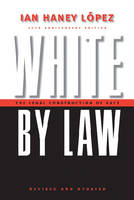
White by Law
Legal Construction of Race
Seiten
1997
|
New edition
New York University Press (Verlag)
978-0-8147-5137-4 (ISBN)
New York University Press (Verlag)
978-0-8147-5137-4 (ISBN)
- Titel ist leider vergriffen;
keine Neuauflage - Artikel merken
Insightful look at how legal definitions of race and racism perpetuate racial inequality
Lily white. White knights. The white dove of peace. White lie, white list, white magic. Our language and our culture are suffused, often subconsciously, with positive images of whiteness. Whiteness is so inextricably linked with the status quo that few whites, when asked, even identify themselves as such. And yet when asked what they would have to be paid to live as a black person, whites give figures running into the millions of dollars per year, suggesting just how valuable whiteness is in American society.
Exploring the social, and specifically legal origins, of white racial identity, Ian F. Haney Lopez here examines cases in America's past that have been instrumental in forming contemporary conceptions of race, law, and whiteness. In 1790, Congress limited naturalization to white persons. This racial prerequisite for citizenship remained in force for over a century and a half, enduring until 1952. In a series of important cases, including two heard by the United States Supreme Court, judges around the country decided and defined who was white enough to become American.
White by Law traces the reasoning employed by the courts in their efforts to justify the whiteness of some and the non- whiteness of others. Did light skin make a Japanese person white? Were Syrians white because they hailed geographically from the birthplace of Christ? Haney Lopez reveals the criteria that were used, often arbitrarily, to determine whiteness, and thus citizenship: skin color, facial features, national origin, language, culture, ancestry, scientific opinion, and, most importantly, popular opinion. Having defined the social and legal origins of whiteness, White by Law turns its attention to white identity today and concludes by calling upon whites to acknowledge and renounce their privileged racial identity.
Lily white. White knights. The white dove of peace. White lie, white list, white magic. Our language and our culture are suffused, often subconsciously, with positive images of whiteness. Whiteness is so inextricably linked with the status quo that few whites, when asked, even identify themselves as such. And yet when asked what they would have to be paid to live as a black person, whites give figures running into the millions of dollars per year, suggesting just how valuable whiteness is in American society.
Exploring the social, and specifically legal origins, of white racial identity, Ian F. Haney Lopez here examines cases in America's past that have been instrumental in forming contemporary conceptions of race, law, and whiteness. In 1790, Congress limited naturalization to white persons. This racial prerequisite for citizenship remained in force for over a century and a half, enduring until 1952. In a series of important cases, including two heard by the United States Supreme Court, judges around the country decided and defined who was white enough to become American.
White by Law traces the reasoning employed by the courts in their efforts to justify the whiteness of some and the non- whiteness of others. Did light skin make a Japanese person white? Were Syrians white because they hailed geographically from the birthplace of Christ? Haney Lopez reveals the criteria that were used, often arbitrarily, to determine whiteness, and thus citizenship: skin color, facial features, national origin, language, culture, ancestry, scientific opinion, and, most importantly, popular opinion. Having defined the social and legal origins of whiteness, White by Law turns its attention to white identity today and concludes by calling upon whites to acknowledge and renounce their privileged racial identity.
Ian Haney Lopez is Professor of Law at Boalt Hall and author of White by Law (NYU Press) and Racism on Trial.
| Reihe/Serie | Critical America Series |
|---|---|
| Verlagsort | New York |
| Sprache | englisch |
| Maße | 152 x 229 mm |
| Gewicht | 408 g |
| Themenwelt | Recht / Steuern ► EU / Internationales Recht |
| Recht / Steuern ► Öffentliches Recht ► Besonderes Verwaltungsrecht | |
| Sozialwissenschaften ► Ethnologie | |
| Sozialwissenschaften ► Soziologie | |
| ISBN-10 | 0-8147-5137-7 / 0814751377 |
| ISBN-13 | 978-0-8147-5137-4 / 9780814751374 |
| Zustand | Neuware |
| Haben Sie eine Frage zum Produkt? |
Mehr entdecken
aus dem Bereich
aus dem Bereich
Grundwerk ohne Fortsetzung. Rechtsstand: 1. September 2024. …
Buch | Hardcover (2024)
C. H. Beck (Verlag)
CHF 109,95
Polizei- und Ordnungsrecht, Kommunalrecht, mit Bezügen zum …
Buch | Softcover (2021)
Vahlen, Franz (Verlag)
CHF 36,25


